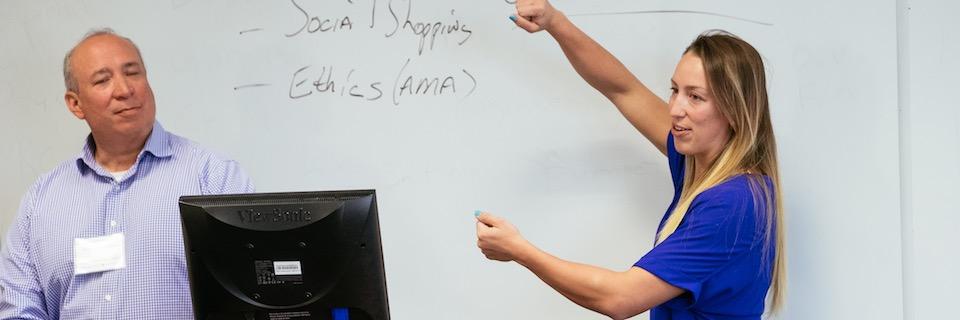Rockhurst University’s Fifth Annual Business Leadership and Ethics Day Puts Experience at the Head of the Class

Every day, students in Rockhurst University’s Helzberg School of Management learn from a nationally recognized faculty about the issues that face business owners and organizational leaders.
But on Tuesday, students also got a chance to talk directly from those same leaders about the particular issues that have challenged their sense of leadership or ethics and the ways they’ve confronted those issues. The fifth annual Business Leadership and Ethics Day brought together 35 speakers from companies and nonprofits, both established and new, making an impact in Kansas City and beyond for a marathon of guest lectures in Rockhurst University’s Conway Hall. Using their own experience as source material, presenters gave students an inside look at the important role that an ethical approach to decision making plays in shaping effective leaders.
“The slate of speakers this year is again incredible,” said Acey Lampe, Ph.D., executive assistant professor of management. “For faculty, being able to provide so many different perspectives from so many high-profile organizations is a privilege, and I think students hearing directly from them goes a long way into making the lessons more immediate and real.”
Speakers included top executives of companies like the Roasterie, wearable sports technology startup ShotTracker, and organizations like the Health Care Foundation of Greater Kansas City and the Greater Kansas City Chamber of Commerce.
Joe Reardon, ’90, the current president and CEO of the chamber and a former mayor of the Unified Government of Wyandotte County and Kansas City, Kansas, exemplified the approach of the day with a story of how his sense of ethics was tested as the county for which he was then the top elected official prepared to make its case to become one of four sites for a casino in the state of Kansas. Without a sense of cooperation and collaboration, he said the constituent cities in Wyandotte County ran the risk of starting a bidding war amongst themselves in an effort to become the site of the casino and earn the largest share of its revenue. Reardon said that could have undermined the larger goal to construct a destination with amenities such as a hotel that would benefit the county's residents as a whole. So, he said, the different communities worked together to come up with a plan that included a set of standards and a revenue sharing plan that would benefit each city. That approach has a lot of lessons in it, he said, and not just for politicians.
“I’m hopeful that in sharing an example like this with you today that you get a flavor for a way of thinking about working in the public realm where you’re not picking winners and losers, where you’re not looking just for the fight to occur and gambling everything in the hopes that you can draw a line in the sand and get yourself to win,” Reardon said. “You’re looking for a way to work with others and move communities forward in a way that actually achieves success.”







